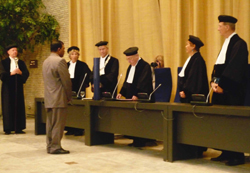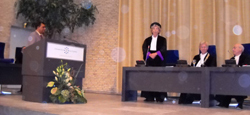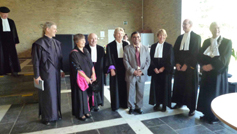Shayamal Kumar Saha
DISSERTATION TITLE:
Promotion of Self-help in Development & Social Change Constructing Non Subject-Object Processes
The thesis defends the idea that the promotion of self-help requires a shift in focus from building individual capacities to what we can do together, to genuine participation of the people and interaction, to space for multiplicity, for local creativity and different ways of learning, a learning culture that encourages the community and the change agents/workers to be co-learners and co-constructors, working together towards opening new possibilities. This is only possible through a non subject-object way of relating. The thesis asserts that the flaw of the existing self-help promotion endeavour is its residency in a subject-object discourse. Despite talks and emphasis on the principles of participation, the traditional self-help promotion conceptualises stakeholders (involved in self-help promotion) as autonomous change entities, so that the unit of analysis and actions are targeted toward those entities. This conceptualisation constructs a paradoxical relation and sustains a subject-object relationship in which one party tries to promote the independence of another. Through the exploration of the possible relevance of a relational constructionist discourse, the thesis advances the notion centering on interaction as both the ‘unit of analysis’ and as ‘locus of transformation’ offers us a way to promote self-help in development and social change. The thesis looked at both a problem solving (PS) approach and an appreciative inquiry (AI) approach with regard to how they create relational realities and, in particular, how they might construct subject-object versus non subject-object possibilities. The thesis shows that, as the problem solving process continued, individualistic constructions became more dominent, the participation gradually diminished, and negativity increased. This did not promote self-help. Appreciative inquiry, on the other hand, gradually constructed co-operative interactions and positive self-help. This did not happen in isolation, however, the particularities of the local communities and their history of relations played a major role. Variations in the local cultural-historical constructions and power issues differently constrained and resourced the interactions and performances of both PS and AI, but with regard to the question ‘what centres and fosters multiple interaction processes as unit of analysis and locus of self-help promotion’, AI produced better performance than PS. However, the thesis defends the notion that not the method of AI in itself is sufficient, but that its effectiveness to promote self-help requires a co-constructive movement with non subject-object ways of relating. The possible success of AI to facilitate self-help in development and change seems to depend largely on our (the change workers) ability to construct non subject-object forms of participation.



